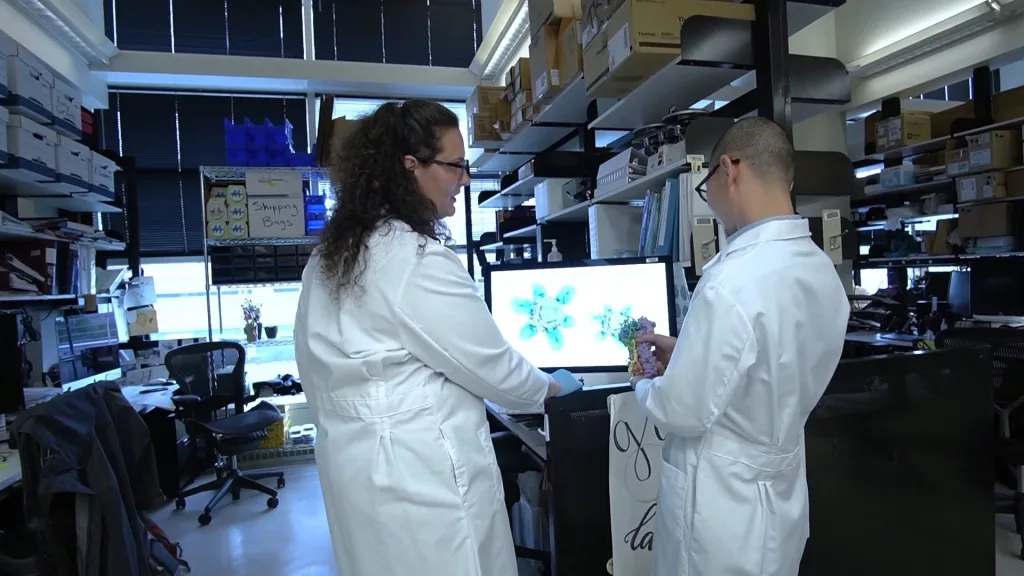WASHINGTON, D.C. — A federal judge announced Friday she will extend a temporary restraining order that prevents the National Institutes of Health from capping indirect costs paid to research universities and medical schools that receive funding from the federal agency.
Judge Angel Kelley of the U.S. District Court of Massachusetts plans to leave the temporary order in place while she decides whether to issue a preliminary injunction that would block the Trump administration change from taking effect while the court cases move forward.
“I have a lot of work to do,” Kelley said at the conclusion of the two-hour hearing.
Kelley, who is overseeing all three lawsuits filed against the NIH for its decision to cap Facilities and Administrative costs at 15%, said she would issue her ruling on a preliminary injunction “as quickly as I can.”
Three lawsuits
The cases arose in early February after the NIH announced it would no longer pay research universities and medical schools the percentage for indirect costs negotiated in the past. Instead, any institution receiving research funding from NIH would have that funding capped at 15%, a figure much lower than what many of the institutions receive.
The change quickly led to three lawsuits — Commonwealth of Massachusetts v. National Institutes of Health, Association of American Medical Colleges v. National Institutes of Health and Association of American Universities v. Department of Health & Human Services.
Kelley issued an order a few days after NIH’s new funding proposal was announced, preventing it from taking effect in the 22 states whose Democratic attorneys general filed one of the lawsuits challenging the policy change.
The next day, Kelley entered a temporary restraining order in the Association of American Medical Colleges case, blocking the NIH’s proposed 15% cap nationwide.
Friday’s hearing included attorneys in all three cases urging Kelley to enter a preliminary injunction and an attorney for the federal government arguing against it.
The NIH writes on its website that it provides about “50,000 competitive grants to more than 300,000 researchers at more than 2,500 universities, medical schools, and other research institutions in every state.”
Facilities and administrative costs go to the personnel and infrastructure projects that aren’t associated with one specific grant.
Vanderbilt, Carnegie Mellon
C. Cybele Raver, provost and vice chancellor for academic affairs at Vanderbilt University in Nashville, Tennessee, wrote in a statement to the court that “a reduction in the indirect cost rate would be devastating.”
During the current fiscal year, the university expects to receive “$118 million in NIH funding for direct costs, while $44.8 million is allocated for indirect costs.”
“And over the next five years, Vanderbilt anticipates receiving an average of $137 million from the NIH for annual direct costs,” Raver wrote. “Based on the predetermined indirect cost rate of 58.5%, which was agreed upon by the federal government as of May 6, 2021, the University thus expects to receive approximately $53.4 million in indirect cost recovery on an annual basis.”
The university, she wrote, uses indirect costs to construct and maintain facilities, pay utility costs and employ administrative staff.
Theresa S. Mayer, vice president for research at Carnegie Mellon University in Pittsburgh, Pennsylvania, wrote in her own statement to the court the school has 189 active research awards from NIH, which total $136.9 million.
Those research projects include working to restore sight to patients with corneal blindness, a large-scale study of families with a history of autism spectrum disorder and developing a novel method for helping patients with long-term paralysis on one side of the body due to stroke.
“By stimulating the spinal cord, this new approach promises to help stroke sufferers recover control of their arm and hand by strengthening pathways damaged by stroke,” Mayer wrote, later adding that “NIH’s proposal to cut indirect cost rates to 15% would end or seriously jeopardize all of the research projects.”
The government’s attorney on Friday requested that if the judge enters a preliminary injunction, she also require the organizations that filed the lawsuits to put up a bond, or financial guarantee.
“If this money goes out there’s no guarantee the government, NIH will get this money back,” the attorney said. “That’s exactly why bonds exist.”
OMB freeze
A separate lawsuit filed by Democratic attorneys general from 22 states and the District of Columbia progressed later Friday with a preliminary injunction hearing.
The suit stems from the Office of Management and Budget issuing a memo in late January that directed departments and agencies to pause federal funding on grant and loan programs. The now-rescinded memo quickly became the subject of two lawsuits, both of which resulted in court orders blocking the Trump administration from holding onto the money.
Chief Judge John J. McConnell Jr. of the U.S. District Court in Rhode Island said during the hearing the temporary restraining order he issued last month will remain “in full force and effect” until he rules on the request for a preliminary injunction.
McConnell said he hopes to make that decision within a week, though he left the door open to taking more time.
The original OMB memo created mass confusion over what programs would be affected and which were exempted. Even after court orders were issued and OMB scrapped the original memo, issues accessing payments continued for some.
The attorneys general filed an emergency motion in early February asking McConnell to enforce his temporary restraining order, alleging the Trump administration was holding up certain grant and loan disbursements.
McConnell then ordered the administration to resume all grant and loan payments that had not yet been restarted.
Sarah Rice, deputy chief of the Public Protection Bureau within the Rhode Island attorney general’s office and assistant attorney general, said Friday the states’ loss and inaccessibility of funding has “continued to this day.”
Rice argued that the harm has not been “abstract” and involves matters such as not being able to make payroll and a lack of availability of contractors.
Daniel Schwei, an attorney from the Justice Department representing OMB, said during the hearing the state attorneys general hadn’t “identified funding that is at risk of being paused going forward for which there is no discretion to pause within the agency.”
Schwei said the attorneys general were “essentially asking this court to oversee funding decisions for their states” that come from two dozen federal agencies.
McConnell said in response that’s not something he would ever do.
The National Council of Nonprofits, American Public Health Association, Main Street Alliance and SAGE filed a separate lawsuit in Washington, D.C., related to the OMB memo.
District Judge Loren L. AliKhan of the U.S. District Court of the District of Columbia held a hearing Thursday over whether to issue a preliminary injunction in that case, but hadn’t issued a ruling as of Friday evening.
AliKhan previously issued an administrative stay and a temporary restraining order.


